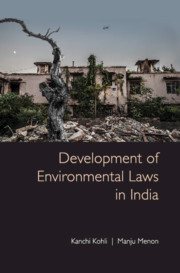Book contents
- Frontmatter
- Contents
- List of Tables
- Preface
- Acknowledgements
- Introduction: Environmental Laws and Development in India
- 1 Fundamentals of Environmental Law
- 2 Institutions Regulating India’s Environment
- 3 Forest Reservation and Conservation
- 4 Pollution Control and Prevention
- 5 Environmental Protection
- 6 Wildlife and Biodiversity Conservation
- 7 Ground and Surface Water Extraction
- 8 Land Acquisition
- 9 Climate Litigation and Policy Frameworks
- 10 Contemporary Environmental Law Reforms
- Index of Laws, Legal Cases and Government and Parliamentary Committee Reports
- General Index
8 - Land Acquisition
Published online by Cambridge University Press: 31 July 2021
- Frontmatter
- Contents
- List of Tables
- Preface
- Acknowledgements
- Introduction: Environmental Laws and Development in India
- 1 Fundamentals of Environmental Law
- 2 Institutions Regulating India’s Environment
- 3 Forest Reservation and Conservation
- 4 Pollution Control and Prevention
- 5 Environmental Protection
- 6 Wildlife and Biodiversity Conservation
- 7 Ground and Surface Water Extraction
- 8 Land Acquisition
- 9 Climate Litigation and Policy Frameworks
- 10 Contemporary Environmental Law Reforms
- Index of Laws, Legal Cases and Government and Parliamentary Committee Reports
- General Index
Summary
INTRODUCTION
India's laws for land acquisition are based on the principle that governments have the power to acquire private property for public use. These powers arise from the Doctrine of Eminent Domain, which allows governments to take such action in exchange of due compensation to the property owner. Legal researchers have argued that the payment of a compensation ‘changes the nature of this take-over from appropriation to acquisition’.
The legal history of land acquisition can be traced back to the eighteenth century when the British colonial administration enacted laws to ‘facilitate the acquisition of land and other immovable properties for roads, canals, and other public purposes by paying the amount to be determined by the arbitrators’. This includes the Land Acquisition (LA) Act, 1894. These laws outline a procedure for acquisition, limits of consent and mechanisms to compute compensation. The legal requirement to ensure rehabilitation of affected families has been part of the legal framework for land acquisition only from 2013.
Today, the acquisition of land is a complex issue that is governed by a multiplicity of laws enacted by both state and central governments. Land is an item in the State List of the Seventh Schedule of the Constitution. However, ‘acquisition and requisitioning of property’ lies in the Concurrent List, giving powers to both central and state governments to enact laws. For matters on the Concurrent List, no state government can override an existing central government law, except with Presidential assent.
The legal framework in operation today is the outcome of this distribution of powers. The most discussed law for land acquisition is the Right to Fair Compensation and Transparency in Land Acquisition, Rehabilitation and Resettlement (RFCTLARR) Act, 2013. However, key provisions of this law have been replaced or exempted in state level laws enacted by some state governments. These provisions have also been read down in some state rules notified under the central law. These changes were preceded by efforts of a newly elected government to amend the 2013 law through a series of ordinances. The implications of this have been discussed further in this chapter. The 2013 law also has limited applicability for land acquired under thirteen other national laws related to coal, railways, highways, atomic energy and other sector specific acquisition.
- Type
- Chapter
- Information
- Development of Environmental Laws in India , pp. 266 - 298Publisher: Cambridge University PressPrint publication year: 2021



